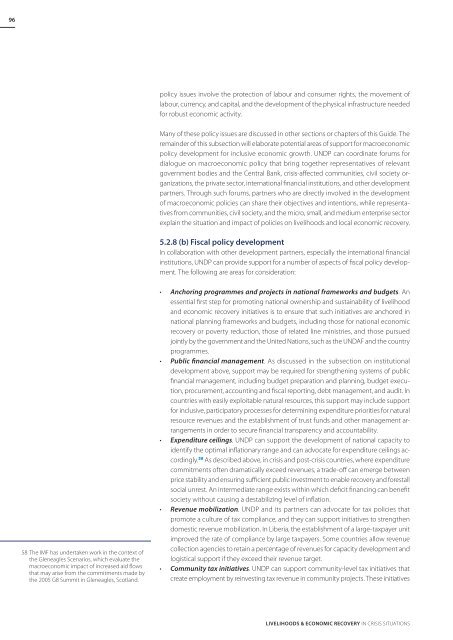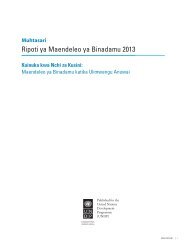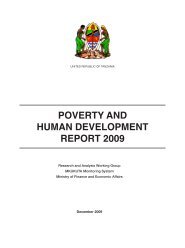Download PDF (4.08 MB) - ReliefWeb
Download PDF (4.08 MB) - ReliefWeb
Download PDF (4.08 MB) - ReliefWeb
You also want an ePaper? Increase the reach of your titles
YUMPU automatically turns print PDFs into web optimized ePapers that Google loves.
96<br />
policy issues involve the protection of labour and consumer rights, the movement of<br />
labour, currency, and capital, and the development of the physical infrastructure needed<br />
for robust economic activity.<br />
Many of these policy issues are discussed in other sections or chapters of this Guide. The<br />
remainder of this subsection will elaborate potential areas of support for macroeconomic<br />
policy development for inclusive economic growth. UNDP can coordinate forums for<br />
dialogue on macroeconomic policy that bring together representatives of relevant<br />
government bodies and the Central Bank, crisis-affected communities, civil society organizations,<br />
the private sector, international financial institutions, and other development<br />
partners. Through such forums, partners who are directly involved in the development<br />
of macroeconomic policies can share their objectives and intentions, while representatives<br />
from communities, civil society, and the micro, small, and medium enterprise sector<br />
explain the situation and impact of policies on livelihoods and local economic recovery.<br />
5.2.8 (b) Fiscal policy development<br />
In collaboration with other development partners, especially the international financial<br />
institutions, UNDP can provide support for a number of aspects of fiscal policy development.<br />
The following are areas for consideration:<br />
58 The IMF has undertaken work in the context of<br />
the Gleneagles Scenarios, which evaluate the<br />
macroeconomic impact of increased aid flows<br />
that may arise from the commitments made by<br />
the 2005 G8 Summit in Gleneagles, Scotland.<br />
• Anchoring programmes and projects in national frameworks and budgets. An<br />
essential first step for promoting national ownership and sustainability of livelihood<br />
and economic recovery initiatives is to ensure that such initiatives are anchored in<br />
national planning frameworks and budgets, including those for national economic<br />
recovery or poverty reduction, those of related line ministries, and those pursued<br />
jointly by the government and the United Nations, such as the UNDAF and the country<br />
programmes.<br />
• Public financial management. As discussed in the subsection on institutional<br />
development above, support may be required for strengthening systems of public<br />
financial management, including budget preparation and planning, budget execution,<br />
procurement, accounting and fiscal reporting, debt management, and audit. In<br />
countries with easily exploitable natural resources, this support may include support<br />
for inclusive, participatory processes for determining expenditure priorities for natural<br />
resource revenues and the establishment of trust funds and other management arrangements<br />
in order to secure financial transparency and accountability.<br />
• Expenditure ceilings. UNDP can support the development of national capacity to<br />
identify the optimal inflationary range and can advocate for expenditure ceilings accordingly.<br />
58 As described above, in crisis and post-crisis countries, where expenditure<br />
commitments often dramatically exceed revenues, a trade-off can emerge between<br />
price stability and ensuring sufficient public investment to enable recovery and forestall<br />
social unrest. An intermediate range exists within which deficit financing can benefit<br />
society without causing a destabilizing level of inflation.<br />
• Revenue mobilization. UNDP and its partners can advocate for tax policies that<br />
promote a culture of tax compliance, and they can support initiatives to strengthen<br />
domestic revenue mobilization. In Liberia, the establishment of a large-taxpayer unit<br />
improved the rate of compliance by large taxpayers. Some countries allow revenue<br />
collection agencies to retain a percentage of revenues for capacity development and<br />
logistical support if they exceed their revenue target.<br />
• Community tax initiatives. UNDP can support community-level tax initiatives that<br />
create employment by reinvesting tax revenue in community projects. These initiatives<br />
Livelihoods & Economic Recovery in Crisis Situations





